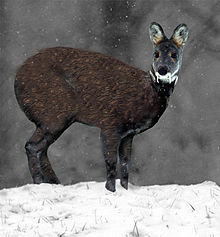Moschidae
| Moschidae Temporal range:
| |
|---|---|

| |
| Skeleton Micromeryx, a typical moschid from the Miocene epoch | |

| |
| Moschus moschiferus | |
| Scientific classification | |
| Kingdom: | Animalia |
| Phylum: | Chordata |
| Class: | Mammalia |
| Order: | Artiodactyla |
| Infraorder: | Pecora |
| Family: | Moschidae J. E. Gray, 1821 |
| Type genus | |
| Moschus Linnaeus, 1758
| |
| Genera | |
|
See text | |
Moschidae is a family of pecoran even-toed ungulates, containing the musk deer (Moschus) and its extinct relatives. They are characterized by long 'saber teeth' instead of horns, antlers or ossicones, modest size (Moschus only reaches 37 lb (17 kg); other taxa were even smaller) and a lack of facial glands.[1] The fossil record of the family extends back to the late Oligocene, around 28 million years ago. The group was abundant across Eurasia and North America during the Miocene, but afterwards declined to only the extant genus Moschus by the early Pleistocene.
Taxonomy and classification[]
Until the beginning of the 21st century it was understood that the family Moschidae (musk deer) was sister to Cervidae. However, a 2003 phylogenetic study by Alexandre Hassanin (of National Museum of Natural History, France) and colleagues, based on mitochondrial and nuclear analyses, revealed that Moschidae and Bovidae form a clade sister to Cervidae. According to the study, Cervidae diverged from the Bovidae-Moschidae clade 27 to 28 million years ago.[2] The following cladogram is based on the 2003 study.[2]
| Ruminantia |
| |||||||||||||||||||||||||||
After Prothero (2007)[3]
Family Moschidae
- †
- Hydropotopsis lemanensis
- Hispanomeryx†
- Hispanomeryx aragonensis
- Hispanomeryx daamsi
- Hispanomeryx duriensis
- Hispanomeryx andrewsi
- Oriomeryx†
- Oriomeryx major
- Oriomeryx willii
- †
- Friburgomeryx wallenriedensis
- †
- Bedenomeryx truyolsi
- Bedenomeryx milloquensis
- Bedenomeryx paulhiacensis
- Subfamily †
-
- Pomelomeryx boulangeri
- Pomelomeryx gracilis
-
- Dremotherium cetinensis
- Dremotherium guthi
- Dremotherium quercyi
- Dremotherium feignouxi
-
- Subfamily †
-
- Pseudoblastomeryx advena
-
- Machaeromeryx tragulus
- Longirostromeryx†
- Longirostromeryx clarendonensis
- Longirostromeryx wellsi
-
- Problastomeryx primus
-
- Parablastomeryx floridanus
- Parablastomeryx gregorii
- Blastomeryx†
- Blastomeryx gemmifer
-
- Subfamily
- Micromeryx†
- Micromeryx styriacus
- Micromeryx flourensianus
- Micromeryx? eiselei - this species is a proposed member of genus Micromeryx[4]
- Moschus
- Moschus moschiferus
- Moschus anhuiensis
- Moschus berezovskii
- Moschus fuscus
- Moschus chrysogaster
- Moschus cupreus
- Moschus leucogaster
- Micromeryx†
References[]
- ^ University of Michigan Museum of Zoology - Animal Diversity Web - Moschus (musk deer) Classification
- ^ a b Hassanin, A.; Douzery, E. J. P. (2003). "Molecular and morphological phylogenies of Ruminantia and the alternative position of the Moschidae". Systematic Biology. 52 (2): 206–28. doi:10.1080/10635150390192726. PMID 12746147.
- ^ Prothero, 2007 (p. 221-226)
- ^ Aiglstorfer, Manuela; Costeur, Loïc; Mennecart, Bastien; Heizmann, Elmar P. J. (16 October 2017). "Micromeryx? eiseleiA new moschid species from Steinheim am Albuch, Germany, and the first comprehensive description of moschid cranial material from the Miocene of Central Europe". PLOS ONE. 12 (10): e0185679. Bibcode:2017PLoSO..1285679A. doi:10.1371/journal.pone.0185679. PMC 5642927. PMID 29036194.
| Wikimedia Commons has media related to Moschidae. |
- Mammal families
- Taxa named by John Edward Gray
- Even-toed ungulates
- Even-toed ungulate stubs


